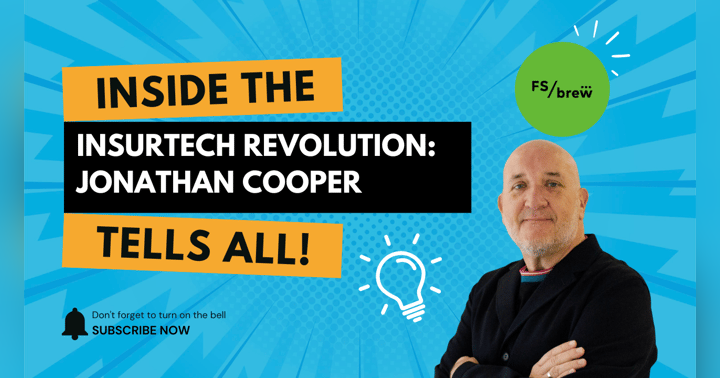Interview with Tanja Magas from Democrance
This is an edited transcript from the podcast episode.
Q: Tanya, this is a question we ask all our guests and, you know, many times insurance is not the number one career that people get into. So how did you get into insurance? And can you please also tell us a little bit about your role at Democrance?
A: That's a fair question I have to admit. I did not dream of an insurance career when I was a little girl, I was definitely one of those many cases that stumbled into the insurance industry rather than actively seeking it out. I graduated from college in New York City in 2008, right into the financial crisis into a job with the Lehman brothers. But luckily, I was able to navigate the market downturn at the time and build my early career doing the typical wall street thing. Eventually I headed back to get my MBA at Wharton and graduated. I was recruited into a leadership development program with one of the largest global insurers. The design of the program was to rotate through different leadership positions, across different key markets for the company, which was quite impactful for my career at the time and took me across offices in New York, London and Dubai. Well, the rest is history. So here we are. And as for my role at Democrance, and while I do wear several hats, my most key role is as the company's chief data and analytics officer. So, my primary mission is to build out and run all data-related capabilities for the company. And this world spans different key fields, which include advanced Analytics, data science, artificial intelligence, and so on. And we do have some exciting new projects in the pipeline.
Q: Excellent. Wow. That sounds really, really interesting. You know, when we go back to the Democrance website and you read what, Democrance is all about, it says it creates value by fully digitizing and automating the entire value chain of insurance. Can you tell our listeners what, what is the business model of Democrance and what it is into?
A: Sure thing. So Democrance is a B2B white-label, sad technology platform that specializes in digitizing the sales and distribution verticals of the insurance value chain. And this is just a mouthful to say that we help insurers brokers and third-party distribution partners automate and digitize their insurance sales processes, whether that's through their website, an agent portal, an API plugin into an insurance exchange, or as a bundle with another product or service. And we really specialize in the sales and distribution aspect of insurance workflows. And we appear to be the only Insurtech that has this specific positioning in the market within our direct peer group. Plus, we take our benchmarking approach very seriously. I found somewhere that 62% of customers say their experience with one industry influences their expectations of other industries. And obviously Big tech is leading in this area of user experience and customer experience.
So, we at Democrance benchmark ourselves against the best in class that is industry agnostic, such as Google, an Apple, or an Amazon. And that obviously significantly differs from our own peer group. And then as for our business model, I would describe it as this three-pronged approach between
A, our in-house build functionalities
B, our ecosystem connectivity and
C, our data and Analytics enablers.
So, we offer several modules to provide our clients with a 360 platform from sales and policy admin, all the way through servicing and the first notice of loss. And these are the things that we build in-house for everything else we integrate with our clients' existing tools and processes. And we also have robust partnerships for pieces that we don't want to specialize in. For example, we are not trying to be a payment processor ourselves, but processing payments is obviously a key aspect of an end-to-end insurance workflow. So, our platform comes with many already integrated options and with several of the best-in-class vendors in this space, such as Amazon pay services,
Q: We did learn that, you know, Democrance started out with a, a focus on Microinsurance, but you do a lot more as you, as you mentioned right now. And so, I just want to go into that space. It's a fascinating and complex space, whether it's the geography or, or the legal aspects, and obviously the small premium size involved. So how, how does Democrance collaborate with its partners to create a sustainable business model here? And, and if you can talk to what you're doing here in UAE or elsewhere in other regions, it'll be, it'll be great.
A: Sure. So Democrance, which actually is an acronym for democratizing insurance was founded with a Microinsurance mission to reach and transform an underinsured market. Our CEO, Michael is deeply passionate and knowledgeable about this particular space. In my opinion, there are several key aspects to making a Microinsurance model a success. Primarily for us are the partnerships that ensure that we share the same passion for this market segment. They not only care, but they also understand the needs, wants, and behaviors of these incredibly unique customer segments, whether that be by the market by coverage. And so on, obviously the premium amounts in question are lower versus traditional market segments. However, if executed in the right way, these insurers can really benefit from completely new untapped market segments, higher transaction volumes and lower operational costs with the right technology approach. Plus, this is a rapidly growing market.
So, the global Microinsurance market reached 78 billion in 2021. Looking forward, the market is expected to reach 112 billion by 2027. That is a 6% CAGR over the next six years. In addition, these segments require out-of-the-box thinking that differs from traditional insurance. And this is in particular to distribution and payments. So instead of targeting this population through an agent call and a checking account debit, the higher I ROI approach would be a premium deduction from a prepaid phone plan of the insured, for example, which also really showcases the importance of partnering with third-party distributors, such as telcos, but even then the insurance penetration here is unfortunately very low emerging markets account for only about 19% of total global premium volume. So, there's just so much more opportunity and work to do here in this space.
I see. So, I, I, I mean, those numbers are staggering, right? I mean, you don't realize that even, even with the low-ticket size numbers that you spoke about are, are really, really massive that that's, that's good, useful information for our listeners.
Absolutely. It is an enormous potential there. And you re mentioned that you need a lot of out the box ideas to really make this whole piece work. You know, just on that itself, since the premiums are low, the Claims fraud can be a big issue in Microinsurance. And we read recently about IFCO and India doing cattle insurance, using RFID chips inserted below the skin of the cattle to Mark Short capital and cattle and prevent frauds, which is incredibly unique. And it's a fairly low-cost solution as well. So how does Democrance use data and any of these creative techniques to tackle fraudulent Claims?
That's a great question. So Claims fraud indeed continues to be a leading concern for many insurers. And this is across both Microinsurance and traditional insurance. Some estimates in the UAE alone put the number of those Intel indulging in fraud at a shocking 30% of all insurance policyholders. Wow. So, this obviously accounts for massive losses to insurers, but the good news is that Machine Learning and artificial intelligence powered by the right data could be a crucial game-changer here. And we actually are developing a really cool new tool at Democrance to tackle exactly this. I'm calling this tool audit alerts in short, these are data discrepancy triggers that are sent to an insurer's Claims servicing rep for further review. And this is how we build them. We run a regression analysis on an existing book of business overlaid with its Claims activity. And then, we look for correlations, what data points are driving high repeated or abnormal Claims activity.
Once we identify those, we build the right workflow. When one of these correlators is identified in a new claim by one of our models, we send an alert to a Claims servicing rep to further review that particular claim. And based on their ongoing feedback, we actually retrain our model to drive higher accuracy. So not only do we help the insurers improve and improve their loss ratio, but we can also optimize their risk management and audit practices. So instead of having to look through a flood of Claims, our technology is able to pinpoint the exact ones that require further review.
Q: So, so I mean, you dug deep into a use case and it's a fascinating use case, and I just want to take it to an elevated level. And this is a question I should have asked you earlier. So, in your role as chief data officer at Democrance, what does a sort of a typical month look like? And, what kind of goals are you reaching for in that role?
A: So, as I'm sure you can tell by the enthusiasm is, in my voice at a macro level, I'm just very passionate about helping drive the transformation and innovation through data and analytics, particularly in the region here where things still stand in the infancy stage. And the potential for impact is currently limitless at Democrance. I have developed, and I'm driving a data strategy with what I call five layers of capabilities, really building from the simple capabilities all the way through the more advanced ones. So, our first layer is the data layer. It is what I call the only source of truth for all of the data that's running through our platform. And it is really the prerequisite for anything upstream; a lot of insurers today struggle to do anything upstream in data science or artificial intelligence because they just don't have the underlying data available.
And here we've really partnered with our clients on high ROI, customized projects. And I will give you my favorite recent project example here.
So, we developed a coverage or insurance recommendation engine for prospects or applicants through the “think Amazon recommendations engine” based on correlated and demographic attributes. We're able to tell individuals or businesses seeking insurance coverage what's most suitable for them based on their direct peer group. So, I can say, Hey, you are a restaurant based in this area with this many employees and this type of menu based on other similar businesses. This is the coverage that you should have and we're able to do so with 90% plus accuracy across covers, and obviously, over time, our model dynamically retrains. So, we're aiming to improve on that stat as well.
Oh, fantastic. So, so it's definitely not only is insurance a career that people should aspire to, but they should also definitely look at data roles as well. You have positioned it very well.
Q: Can you tell us what are the latest trends that you are seeing within Data Analytics? Well, specially how is data being used from an insurance perspective? You know, functionally like within underwriting Claims or from a customer perspective, you know, talk us through it, from an industry point of view or even, even with respect to Democrance.
A: Absolutely happy to do so. Obviously, there is a lot of movement within this space and a lot of really exciting developments. If I had to single out a couple, I would obviously have to mention the continued explosion of data. This stems from the use of sensors. And obviously the huge increase in the number of connected consumer devices, such as fitness trackers, home assistance, smartphones, even telematics boxes and cars and experts estimate that there will be, be up to 1 trillion connected devices within the next three years. So, we're talking massive, massive data. And of course, the result of this avalanche of new data created by these devices will allow insurers to understand their clients better. And this will result in new product categories, more dynamic pricing and real-time service delivery. The second key development will be an advancement in cognitive technologies. So, this is more of the nerdy part.
While current technologies are primarily used for image voice, and unstructured text processing, future technologies will evolve to be applied in a wider variety of applications. And there will be continued to experiment experimentation. So, for example, to combat data quality and computing power shortcomings, I have seen these hybrid models or algorithms spring up that are super interesting. They try to leverage knowledge from better understood, understood fields and industries such as physics, and then take them and apply them to other industries through causal inferences. That just means that we rely less on the data that have been generated specifically in insurance, because we can actually take correlated data from other industries until we ourselves have the data ready to be able to use it. But now the critical question is how will all of this help shape the insurance industry? So, I would say that on the sales side, there will be fewer sales and will be just much more automated.
So, agents will move into a different role where they will become more educators, and they will help their clients manage overall portfolios rather than pitch them one specific insurance product. Obviously underwriting will mostly be automated and there will be our products available that require extensive underwriter oversight. Obviously, if you want to underwrite a space shuttle, or that Titanic, this will still require manual oversight as an extremely specific risk in Claims IoT devices will be extensively used. And a lot of these will also be automated through image processing and customer service will be automated through bots and turnaround times here will no longer be measured by hours or days. They will be measured in seconds. Lastly and most excitingly pricing will become much more dynamic in real-time. So, for example, instead of a static annual premium amount, Motor insurance will be underwritten based on the insured's driving behavior and on a monthly and even a daily basis, which is just much more accurate for the behaviors at hand.
Interviewers: The thought that came to my mind was, Hey, where are all the humans going away? Are they getting replaced? But then you said, you know, they're doing the more value-added activities and, in a way, they're relating more with the customers and spending more time with them. And, and the second point that jumped out was about, you know, the Motor insurance piece. It is a much-lamented issue in this industry. And we just do the rating, which is completely a first of all is highly discounted. Second. It is not related to driving behavior at all. Although a few companies are trying to change this in the region here, including Beema. So, let's see how that, how that develops.














